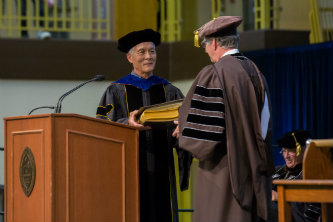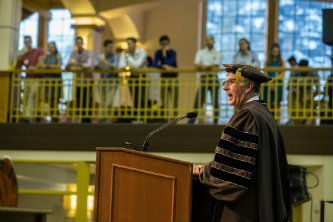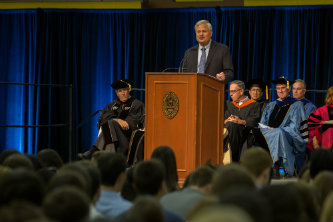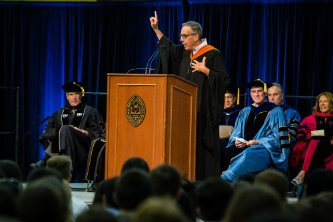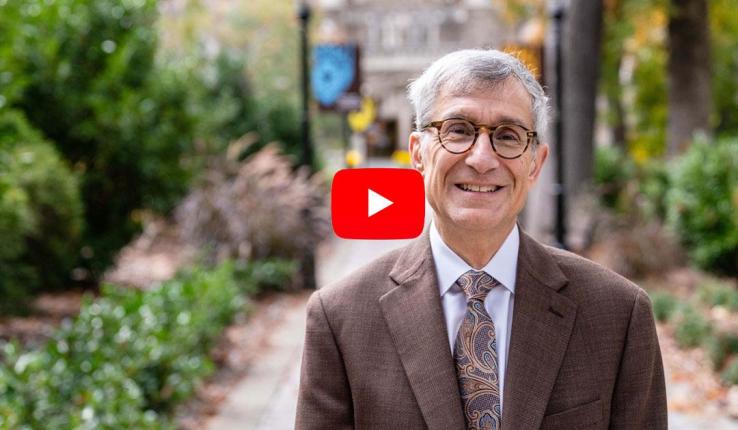University Convocation kicks off the academic year
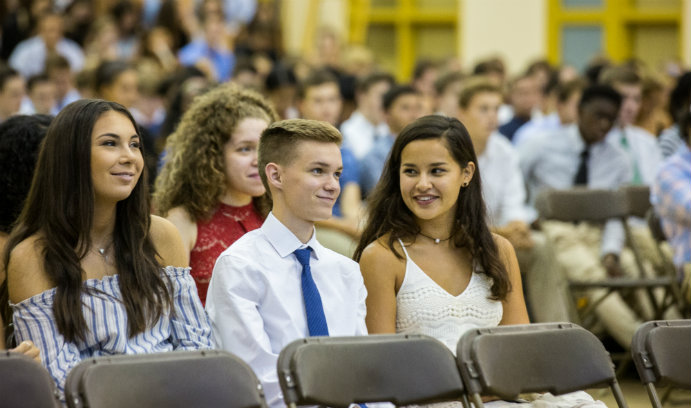
The Class of 2020 was officially inducted into the Lehigh University community at the academic convocation.
On the fourth day of their orientation experience, members of the Class of 2020 maintained their enthusiastic spirit as they filed into Grace Hall for this year’s University Convocation, the formal induction of Lehigh’s newest community members.
The Sunday evening program and official start of the academic year began with a welcome from Ian Birky, interim vice provost for student affairs, who noted the Class of 2020’s graduation year.
“Perhaps with this particular graduation year or destination, your signature trait as a class will be one of clear vision, which increases the chances of hitting your targets,” said Birky.
Birky encouraged students to learn, grow and take advantage of the many support resources available on campus. He then presented President John Simon with a book signed by all members of the Class of 2020, affirming their commitment to the Student Senate Statement on Academic Integrity.
Simon shared with students what to expect and what Lehigh expects of them.
“You are now part of an academic community,” said Simon. “This means much more than just taking a prescribed set of courses that fulfill a requirement for a major. At Lehigh we pride ourselves on being an inclusive living and learning environment.”
As he did with students’ families during Thursday’s parent orientation, Simon referenced the university’s “Principles of Our Equitable Community.”
“At Lehigh, we celebrate our diversity and inclusion,” he said. “We embrace our academic, cultural, economic and physical differences. We respect one another. We look out for one another, and we help one another succeed. These principles are not just words on paper. They’re what we believe in and what we expect of our entire campus community.”
Simon also spoke of how students will grow and change as individuals through challenges both in and out of the classroom.
“As David Mitchell writes in one of my favorite books, Cloud Atlas, ‘There ain’t no journey what don’t change you some,’” said Simon. “And you will change during your college years as you discover who you are and what you stand for, which brings me to an important point: Lehigh will certainly help you learn how to think, but we will never tell you what to think. In the course of your time here, you’ll routinely come in contact with people who will think very differently from you.”
Simon noted the divisiveness of the current presidential campaign and the expectation of respectful and civil discourse. He encouraged students to “speak up and speak out” while remaining aware of the impact of their words and the importance of trust.
“You are beginning your college life during a challenging time in America. ... You will have differences in opinion with classmates, teammates, hall mates, professors and me. We are all human beings, after all. ...The atmosphere will not always be happy, the tone of conversation will not always be friendly. You won’t be on the same page with the person sitting across from you. In fact, occasionally you might not even be in the same book. It is how you conduct yourselves in these situations that makes all the difference.”
Simon encouraged positive engagement off campus as well. He introduced Bob Donchez, mayor for the City of Bethlehem, who welcomed students.
“I encourage you to step off campus,” said Donchez. “Sample our restaurants. Experience the entertainment, festivals, history and the arts that Bethlehem has to offer.”
Donchez also highlighted several collaborative efforts between Bethlehem and the university. “The partnership between the city and Lehigh is strong,” he said.
‘We intend to challenge you.’
Provost Pat Farrell provided three indicators of academic success. The first, he said, is that a student has worked hard on difficult problems.
“We live in a complex world. The problems we need to face are complex. We want you to be ready for a complex world,” said Farrell.
The second indicator, he said, is that students value different viewpoints rather than seeking out only those who agree with them. We achieve great results, he explained, when “we’ve looked at issues from a wide variety of perspectives, taken value from all those perspectives and come up with approaches that none of us ever thought of on our own. That’s academic success.”
The third indicator of academic success, said Farrell, is that a student knows how to work through failure, frustration and doubt.
“You can and you will work through those times when you aren’t as successful as you’d hoped, you’re frustrated because the world isn’t behaving in a way you might like, and you’re doubtful. ... We are quite confident that in fact you are up for all of those challenges. If you don’t find yourself in that situation of not always being successful, sometimes being frustrated ... then you’re not challenging yourself and we’re not challenging you. We intend to challenge you, and I expect you to challenge yourself,” he said.
Farrell urged students to consider now the academic success they’d like to have, rather than waiting until later in their college career.
“Start now,” he said. “That’s the only way to really make this a more successful four years than you can imagine.”
‘I am not throwing away my shot.’
Keynote speaker Augustine Ripa, professor of theatre, began his talk with a reference to the Broadway musical Hamilton. Ripa encouraged the Class of 2020 to make their way and make their fate with an attitude similar tothat of Alexander Hamilton, who in the play repeats a mantra: “I am not throwing away my shot.”
“You’re undertaking the first steps on a journey that will present many, many forks in the road,” said Ripa. “Every time you think you know what you’re doing, something will come up and you will be blessed with the opportunity to make a decision and change. These choices can be exciting, they can be stimulating, and indeed they can be a bit daunting.”
Change, said Ripa, is inevitable. He explained how he originally intended to major in biology and become a physician but instead chose to major in theatre, a decision that changed the course of his life.
“The world is full of opportunities, and your job here is not to throw away your shot, not to squander the opportunity to liberalize, to become bigger than you are now socially, ethically, intellectually,” he said.
Beyond satisfying course requirements, “the least you have to do to earn something,” Ripa encouraged students to work diligently at developing the “habits, traits and essential skills that are the essences of a liberal education.”
“These are things you cannot major in,” he said. “You cannot major in originality, creativity, problem solving, collaboration, quantitative analysis, visual literacy, oral and written communication ... civic awareness, ethical reasoning. You can’t major in perseverance. You can’t major in moxie. But any good major will help you cultivate all of those essential traits and characteristics that have to be in that backpack that you keep putting good things into as you go through your college days, whatever your major.”
Ripa closed with some practical advice for the Class of 2020.
“You need to know the rules. You need to know the limitations that will allow for all this freedom—the social rules and the academic rules. You need to engage, sit in the front, talk to your professors, send them messages. You need to eat and you need to sleep. You need to read and do the work. Get help when you need it. But most of all you need to think about expanding yourself: going abroad, joining the choir or the drama group or the chess club. What you learn in the next four years may be very specific to a major or a career even, but really what you’re going to be learning is how to keep learning. You’re not going to stop learning. And when you learn to learn, you never stop learning, you never mentally grow old. You enjoy the fountain of youth.”
Photos by Christa Neu
Posted on:


